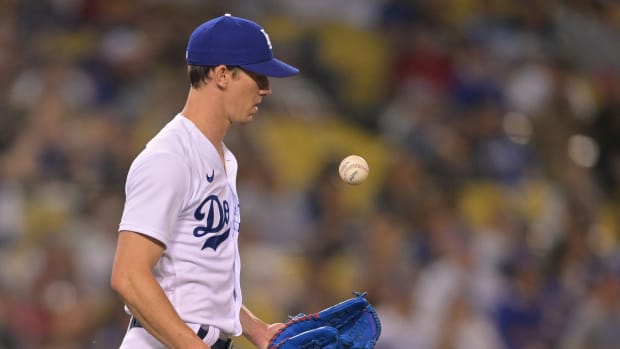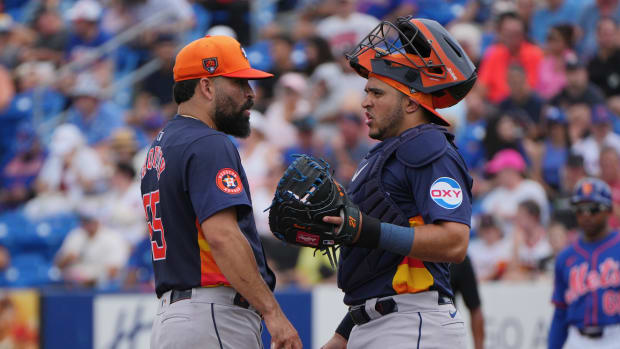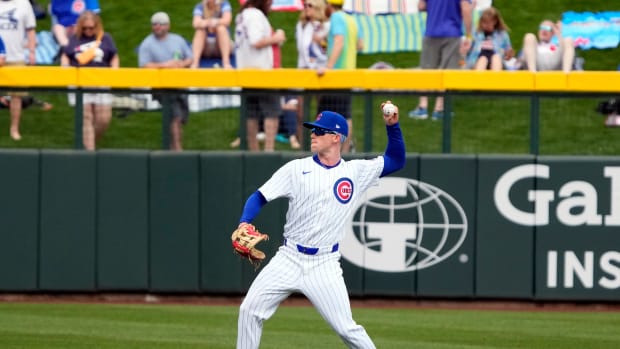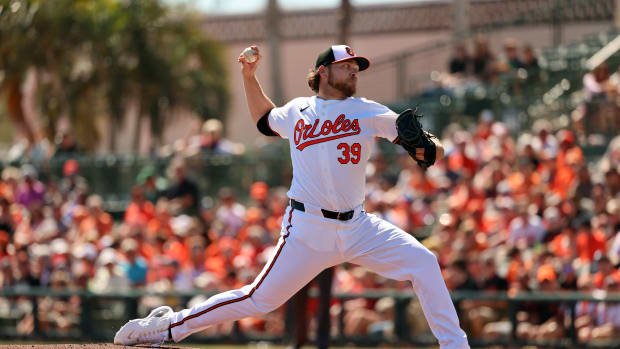Strasburg shutdown haunting Nationals in Division Series
Stephen Strasburg has only been able to watch as Washington's season gets pushed to the brink. (AP)
Even before Edwin Jackson threw his first pitch on Wednesday afternoon, the second-guessing had already started — and not just among the media and fans. Fox Sports' Ken Rosenthal reported an anonymous Nationals player telling him, "If we had 'Stras, we’d be up 2-0," referring to Stephen Strasburg. Washington's 24-year-old ace was shut down following his Sept. 7 start due to an innings cap put in place by general manager Mike Rizzo out of concern for the pitcher's workload in his first full season back from September 2010 Tommy John surgery. Instead of starting in the Division Series against the Cardinals, he's a bystander, and he'll remain that way for the rest of the season.
Would things have unfolded differently for the Nationals had Strasburg been available? It's impossible to say, but the one constant from the D.C. upstarts in their first three postseason games has been shaky starting pitching. Game 1 starter Gio Gonzalez walked seven hitters in five innings and was lucky to escape with just two runs allowed; the bullpen combined for four shutout innings while the Nationals rallied for two runs in the eighth to win. Game 2 starter Jordan Zimmermann was tagged for five runs in three innings, setting off a 12-4 rout, and Jackson lasted five innings while allowing four runs — three via a home run by rookie Pete Kozma — in the team's 8-0 loss on Wednesday. Together, that's 11 runs allowed in 13 innings, with eight walks against 12 strikeouts. Even against a club like the 107-loss Astros, a team would be lucky to take two out of three behind such performances. Even if Strasburg had pitched and done well, such a performance against the battle-tested defending world champions might have been wasted by a Nationals team that hans't gotten its own offense in gear, scoring just seven runs in three games, none on Wednesday.
It's easy to believe that Strasburg would have fared better than his teammates have, particularly given that in his one start against the Cardinals on Sept. 2, he twirled six innings of two-hit shutout ball while striking out nine. After all, the only major difference between the Cardinals' lineup in that start and the one they've fielded in the postseason thus far is the absence of catcher Yadier Molina, who received the day off against Strasburg. On the other hand, the Cardinals were amid one of their worst stretches of the season, winning just one series out of six — that against the Mets at home — and six games out of 19 from Aug. 27 through Sept. 16. The start was Strasburg's second-to-last of the season, sandwiched between two less flattering turns against the Marlins in which he was battered for 12 runs (10 earned) in eight innings, and as part of a downward trend of reduced velocity that may have compromised his effectiveness in the second half.
If the Nationals can't rally to overcome the Cardinals, the decision to shelve Strasburg will be debated until the sun crashes into the earth and ends life as we know it. Worse, nothing short of a world championship is likely to end the second-guessing, either inside the Nats' clubhouse or out. Those with no stake in the future of a pitcher who stands to earn hundreds of millions of dollars if he stays healthy will declare themselves more knowledgable than Rizzo, the one man who has stood in the spotlight's glare and taken ownership of the decision after extensive consultations with top doctors, sports medicine experts and baseball men.
Could the Nationals have handled Strasburg's workload differently in order to preserve his availability for the playoffs? Absolutely. They could have thrown caution to the wind and ignored his innings limit even while minding his pitch counts and his stress levels, hoping he had enough in the tank to carry them through October. They could have kept him in extended spring training until May, ramping up his workload so that he could proceed through the season without interruption or controversy, though it's doubtful that his replacement could have provided the 32 innings of 1.13 ERA ball that Strasburg gave the Nats in April, when the team kept pace with the Braves via a 14-8 start; their whole season might have come down to winning the wild-card play-in, and as the Braves showed, anything can happen there. They could have skipped a few turns along the way as the White Sox did with their ace, 23-year-old Chris Sale, a converted reliever who threw 192 innings in his first year as a starter, though a 4.22 ERA over his final nine starts and an early exit from final one on Sept. 29 amid his team's late collapse don't constitute a ringing endorsement of that strategy.
Or they could have stashed Strasburg on the disabled list in midseason with a real or exaggerated injury, though it wasn't until late in the year that the team built up enough a division lead that remained above five games for any appreciable length of time. The cost over a short stretch via the step down from Strasburg to John Lannanwouldn't have been more than a few runs, and they would have had their ace available for the playoffs. That said, one of Rizzo's key concerns was the increased injury risk of such a scenario. As he told ESPN's "Outside the Lines" program, "[E]very injury expert that we have spoken to [says] the effect of shutting a pitcher down and then ramping him back up and having him throw a full go is much more dangerous than having him pitch through the season and shutting him down."




































